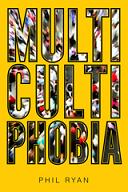Multicultiphobia . Toronto: University of Toronto Press, 2010.
This interview with Embassy magazine provides a good introduction to the book.
Myungsook Lee also did a very helpful interview, which allowed me to address various reactions to the book.
Yeungnam University Press has issued a Korean-language translation of Multicultiphobia. Here is the Preface I wrote for it.
“The paradox of hegemony and the ‘Multiculturalism of the individual’,” Canadian Ethnic Studies 51, no. 2 (2019): 153-68.
Abstract: Widely popular social ideals often manifest a paradox of hegemony, a vulnerability to a particular type of erosion that occurs when opponents abandon their explicit attacks, seeking instead to blunt and transform the ideal through an ostensible conversion to it.
Christian Joppke’s Is multiculturalism dead? is a case in point. Having long proclaimed the “retreat” of multiculturalism, Joppke now advocates a “multiculturalism of the individual,” while repeatedly suggesting that this is not multiculturalism at all. His account, moreover, misunderstands individuals and the profound group-based dimensions of their identity, thus obscuring the group biases of the supposedly neutral liberal state and undermining the normative underpinnings of multiculturalism.
To guard against the paradox of hegemony and to sustain multiculturalism as an equality-seeking ideal, we need, not vague slogans, but practices of careful normative deliberation, both among scholars and in society as a whole, in order to reinforce our always tentative understanding of what a just multiculturalism does and does not entail.
The published version is available, behind a wall, here.* The “Accepted Manuscript” (my final submitted version), is available here.
*(Those with access to Carleton University Library journals may access it free of charge here.)
“Does Canadian Multiculturalism survive through state repression?,” Nationalism and Ethnic Politics 22, no. 3 (2016): 342-50.
Abstract: Emma Ambrose and Cas Mudde argued in this journal that the absence of far-right parties in Canada can be attributed, among other factors, to “strong state repression of dissent” on multiculturalism policy. This article provides numerous examples of such dissent, to show that the state repression invoked by Ambrose and Mudde does not exist. The article also argues that certain “supply-side” explanations for the absence of a strong far-right apply to the Canadian case. It notes in particular how Steven Harper’s Conservative government occupied much of the political space that might otherwise have been available for far-right challengers.
The published version is available, behind a wall, here.* The “Accepted Manuscript” (my final submitted version), is available here.
*(Those with access to Carleton University Library journals may access it free of charge here.)
“The multicultural state and the religiously neutral state: Comment on Cliteur,” International Journal of Constitutional Law, 12, no.2 (2014): 457-463.
This short comment on the arguments of the University of Leiden’s Paul Cliteur for a strong form of secularism was written during the controversy over Quebec’s proposed “Charter of Values.” The comment suggests that accepting Cliteur’s arguments could lead democracy in a problematic direction.
Abstract
” Our multiculturalism: Reflections in the key of Rawls,” in The Multiculturalism Question: Debating Identity in 21st Century Canada, ed. Jack Jedwab (Montreal: McGill-Queen’s University Press): 2014.
(From the intro) “John Rawls was a theorist who grappled with the challenges of liberal modernity. Given his status as perhaps the most influential liberal philosopher of recent decades, and given the controversy over the relation between multiculturalism and liberal values, a Rawlsian assessment of our multiculturalism may lead us to ask fruitful questions about that multiculturalism and its prospects. This paper will begin by examining Rawls’s thoughts on pluralism. I will then summarize his vision of ‘justice as fairness,’ which will be used to reflect upon our multiculturalism. I conclude with some Rawlsian speculations on the prospects of that multiculturalism.”
Pre-publication version
“Canada’s great national itch: Debating multiculturalism,” Fedcan Blog, 28 February, 2011.
Many Canadians awaken to certain aspects of their society only when they see those aspects reflected in immigrants groups. Thus, “Rather than an endless discussion about whether immigrants must adapt to ‘Canadian ways,’ we need to become more aware of what those Canadian ways truly are, and we all need to talk about just what we want them to be.”
“Multiculturalism, Multicultiphobia and Pluralism,” Fedcan Blog, 13 December 2010
This short comment puzzles over an anomaly: While we expect the phrase ‘official X’ to refer to a government understanding or definition of X, this is rarely the case with political discourse concerning ‘official multiculturalism’: “All sorts of claims are made about it. These claims are almost never supported by reference to some official source.”
Taming Memory Presentation to the opening plenary of the Canadian Studies Association annual conference. Toronto, 4 November 2010.
This talk uses some incidents in the life of my Grandfather Ryan to reflect upon the desire to “tame” historical memory so that it won’t challenge a people’s self-image, and will support current ideologies.
Beware ‘Shared memory’. Canadian Issues, 2010.
“History being a tremendously pliable thing, a new story can be built and sold, one which constructs Canada as a warrior nation, whose legacy of courage and valour will inspire young Canadians: Inspire them to ‘Take up our quarrel with the foe,’ without inquiring too closely just how this foe became a foe, or whether this is a ‘quarrel’ that it is prudent to pursue.”
Multiculturalism and Extremism? Four Questions. Metropolis (On-line)
I was asked to comment on “the alleged link between Canada’s multiculturalism policy and extremism.” This is my brief reply.
Earlier Writing
“The Backlash Against Multiculturalism Revisited” [Response to Jonathan Kay] Policy Options, September 1998, pp. 54-55.
This is a dry run for various themes that I later developed in Multicultiphobia.
